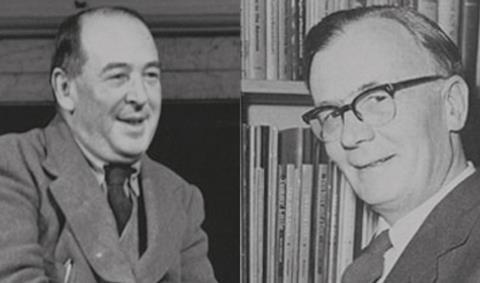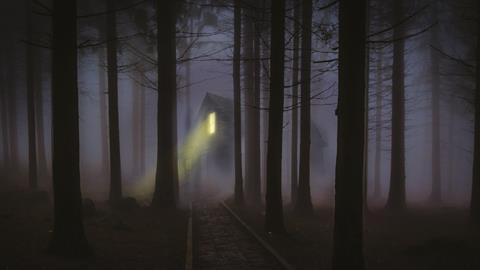Most Christians have been taught that those who believe in ghosts and paranormal experiences are either deluded, or worse, being deceived by the demonic. But that’s not what scripture teaches, argues Matthew Arnold
In times of great uncertainty, such as after the two world wars, 9/11 (and I predict post-Covid), where thousands have died, the possibility of an afterlife is brought into sharp focus. Questions bubble to the surface such as: “Where is my loved one now that they have died?”, “Why have I just seen an apparition of my deceased relative?” or even “Help! My house is haunted!”
In my ministry over the past ten years, I’ve noticed that almost everyone has a spooky story to tell, either of their own encounters or those of a family member or friend. Typical Christian responses tend to fall into two polarised camps: either rationalising the supernatural experience as having been all in the mind, or explaining it away as a demonic deception. This often leaves the person looking for answers in other spiritualities that take their experience more seriously.
But what if – contrary to most Protestant teaching – it is possible for the souls of the deceased to linger? In other words: what if ghosts really do exist?
ALMOST EVERYONE HAS A SPOOKY STORY TO TELL
Hebrews 9:27 is a favourite anti-ghost text: “it is appointed for mortals to die once, and after that the judgment” (NRSV). But read the full sentence, which runs into verse 28: “And just as it is appointed for mortals to die once, and after that the judgment, so Christ, having been offered once to bear the sins of many, will appear a second time, not to deal with sin, but to save those who are eagerly waiting for him.” Note the preceding: “And just as…” This is a statement comparing the period between the crucifixion and second coming, and between a person dying and facing the judgement. Just as there’s at least a 2,000 year gap between Jesus dying and his second coming, it can be argued that there is a time lapse between a person dying and the judgement. Rather than being an argument against the existence of ghosts, the sentence in its entirety actually opens up the possibility of an intermediate state for those who have died.
The departed are portrayed as conscious when Jesus talks with Elijah and Moses at his transfiguration (Mark 9:4). While Elijah was translated and didn’t die, Moses had been long dead (Deuteronomy 34:5-6). Yet here we see him alive and speaking with Jesus, even before Jesus rose from the dead, as the firstfruits of the resurrection to come (1 Corinthians 15:23). The truth conveyed by this glimpse into the heavenly dimension is that the departed are not in stasis but are active.
Scripture sometimes uses the metaphor ‘sleep’ for death (eg 1 Thessalonians 4:13-14). Some claim this shows the dead are inactive. However, this ignores the power of the metaphor. Sleepers still exist in the same way that someone in the grave still exists; they have a state of awareness, but one that the awake are unable to access. Modern technology reveals our brain’s incredible activity, even while asleep. Rather than unconscious existence, this metaphor opens the idea that the dead are conscious in a way that was not obvious to previous generations.

Having shown that there is a biblical case for a conscious intermediate state for the departed, where could it be?
Science now reveals that we exist in 3D – three spatial dimensions – plus one time dimension. And many believe that this is only part of further dimensions that exist within the universe.
Mainstream media is beginning to offer suggestions of what existence in these other dimensions may be like. Examples include the ‘Upside Down’ in Netflix’s Stranger Things and astral travelling in Sarah Pinborough’s novel Behind Her Eyes (HarperCollins). I do not advocate deliberate entering of other realms, but can we perhaps hear God speaking via these ideas to those outside the Church, rather as Paul appealed at the Areopagus to the Greek poets (Acts 17)?

The thousands of reports of near-death experiences (NDEs), where those experiencing them see the everyday world from an unseen vantage point, suggest that our consciousness may provide a ‘telescope’ into at least one dimension outside of our normal, everyday existence. Rather than dismissing NDEs because they do not fit our preconceived interpretations of the afterlife, could we use them as an interpretive lens for scriptures such as Elijah’s servant seeing the heavenly army (2 Kings 6:17), Stephen’s vision of the open heaven (Acts 7:55), Paul’s “third heaven” visit (2 Corinthians 12) and the great “cloud of witnesses” referenced in Hebrews 12:1?
Haunted houses
My journeying among those involved in new spiritualities has led to a calling to deal with a haunting that involved both nonsentient and sentient apparitions, poltergeist-type knockings in walls and footsteps in the loft. The person enquiring said they hadn’t the power to deal with this, even though they were aware of the reality of the spiritual realm and were advocates of blessing. I informed them that I too didn’t have the power, but I knew someone who did – Jesus!
A four-hour assessment conversation with them attempted to eliminate any natural and medical causes. Then, covered in supporting prayer from close friends, I began the house cleansing by announcing the resurrection of Jesus in the centre of the home. As I prayed through the place I used blessed oil to put the sign of the cross onto door and window lintels and posts, and experienced a couple of very cold spots that natural means couldn’t account for. Anything there that wasn’t aligned with the purposes of God was sent to Jesus to deal with. We prayed around the perimeter of the property and at the end I was able to pray the peace of Christ into the person. Enquiring the next day, the person said that they, and their family had slept like babies that night – something they’d not done for months due to the haunting.
Jesus’ ministry was firstly to proclaim the gospel, and his second ministry was healing those afflicted by spiritual issues. We do well to note this balance in our own ministries.
ARE GHOSTS DEMONS?
One serious objection raised against ghosts is the belief that apparitions cannot be those of the departed (for reasons we’ve addressed earlier), and so must, therefore, be demonic impersonations.
The two main scriptures used to support this hypothesis concern Satan appearing as an angel of light (2 Corinthians 11:14), and Saul and the medium of Endor (1 Samuel 28).
The context of 2 Corinthians 11:14 is Paul’s warning about selfappointed super-apostles who were demanding financial support from their disciples. It is not a standalone verse written about ghosts. While impersonation of the dead may be within the repertoire of a demon, we should “test the spirits to see whether they are from God” (1 John 4). No test would be required if all spirits were demons!
BIBLICAL PROHIBITIONS ON INITIATING CONTACT WITH THE DEAD SUGGEST THIS IS POSSIBLE
The most famous passage of scripture regarding contact with the departed is found in 1 Samuel 28 where Saul rejects God’s prohibition on necromancy, found in Leviticus 19:31, and employs a medium to summon the deceased Samuel. Some claim this was an impersonating demon, not Samuel. But this is eisegesis (reading into the text what you want it to say). Instead, the text clearly states it was Samuel who pronounced Saul’s doom. The translators of the Septuagint believed that Samuel had indeed been raised up and mention it in their translation of 1 Chronicles 10:13: “Saul enquired of a wizard to seek counsel, and Samuel the prophet answered him” (Brenton’s translation, italics mine).
Objections to the real Samuel being summoned by the medium are, at best, attempts to read scripture with the prior belief that communication between the living and the dead is impossible. Biblical prohibitions on initiating contact with the dead actually tell us this is possible, for God does not deal in absurdities, forbidding that which is impossible to perform.
WHY DO THEY APPEAR?
Scripture promises rest for those in Christ in the afterlife. However, the biblical idea of rest is not about inactivity but the removal of that which causes us to toil and labour, releasing opportunities for deepening our relationship with God and each other. The “mansions” mentioned by Jesus in John 14:2 (NKJV) signify, in the original Greek, that the afterlife is not about permanent residences but a journey between temporary resting places and our final destination at the resurrection.
If there are places, or states, of spiritual development in the afterlife, perhaps this journey involves dealing with unresolved issues and unreconciled relationships in this life through a visitation, as some accounts of apparitions suggest.
Maybe, as part of the ‘communion of the saints’, this journey includes encouragement to us to continue in our ministries, such as when the departed CS Lewis appeared twice to JB Phillips, encouraging his Bible translation work. In his book, Ring of Truth (Hodder & Stoughton), Phillips states that Lewis spoke words that were pertinent to Phillips’ circumstances and was “ruddier in complexion than ever, grinning all over his face and, as the old-fashioned saying has it, positively glowing with health”. Phillips didn’t know about Lewis’ death a few days earlier, news of it being buried in the foremost news of the time – the assassination of John F Kennedy. A week later, Lewis appeared to Phillips once more with the same message. In Blind Spots in the Bible: Puzzles and paradoxes that we tend to avoid (BRF), Adrian Plass recalls a meeting with Phillips’ widow, who confirmed that she witnessed his side of the first conversation with Lewis. Suggestions of this being a demonic impersonation fail when the fruit of Phillips’ resulting work are analysed.
Some people experience ‘crisis apparitions’, where a departed loved one appears to those left behind to bid farewell. This may explain why the disciples believed Peter’s angel was at their door in Acts 12:15. After James’ execution by Herod, they expected the newly-imprisoned Peter to be executed imminently, and may conceivably have believed that this had already happened. As angels are messengers from God, whether nonhuman or human (eg Matthew 11:10; Luke 7:24; 9:52 and Galatians 4:14), a crisis apparition involving Peter’s ghost would fit this belief.
Perhaps for some, rest is not granted – especially if there is an issue similar to Abel’s blood crying from the ground (Genesis 4:10), where there may be a ‘spiritually polluted’ landscape and where justice may be being sought (Revelation 9:6).
JESUS DID NOT CHALLENGE THE CULTURAL BELIEFS THE DISCIPLES HAD REGARDING GHOSTS AS SPIRITS OF THE DEAD
All of these reasons are found in the cultures in which the New Testament was birthed and in which the disciples lived. Twice Jesus could have informed us that ghosts do not exist: first in Matthew 14:22-33, where the disciples see Jesus walking on the water and think he’s a ghost and again in Luke 24:36-43, where Jesus appears to the disciples and says that he is not a ghost. On neither occasion does he take the opportunity to challenge the cultural beliefs the disciples had regarding ghosts as spirits of the dead.
Apparitions may appear for a variety of reasons, and although scripture forbids initiating contact with the dead, it endorses testing communications received from them, and their fruit.
With a fresh look at the biblical evidence suggesting that ghosts may exist, taken alongside the thousands of reports of claimed encounters with them, and today’s science suggesting the existence of other dimensions, it seems that the world really could be much stranger than we thought.
Recommended further reading
The Awakening by Friedrich Zündel (Plough Publishing) contains the account of 19th-Century German Lutheran pastor, Johann Blumhardt and the exorcism of parishioner Gottliebin Dittus. This level-headed, respectable Protestant minister wrote of his introduction to the phenomenon of demonic possession and his attempts to stay within biblical guidelines. His testing of the spirits, theological reflection and study of scripture, such as Luke 8’s Gadarene demoniac, caused him to examine his tradition’s understanding of the afterlife for those outside of Christ, and the problems that unconfessed sin may cause them.
Firmly believing that these human (and one non-human) spirits could not remain within Gottliebin, he would send them to places such as his church and surrounding grounds to hear his preaching; they would eventually disappear after a while. The role of confession had initially been ignored by this good Protestant but after his encounter with spirits of the departed, he realised its need. An awakening then began in his church, spreading to the surrounding area, the fruit of his initial obedience in seeking to minister to all, whether in or out of the flesh.
This is a challenging read, with some recorded dialogue between Blumhardt and the spirits, but are we, like Blumhardt, prepared to examine and follow the evidence, no matter what our initial beliefs are? What spiritual blockages are in our own mission fields, which a different interpretive lens might be able to reveal?
The Supernatural Worldview by Cris Putnam (Defence Publishing) is an in-depth exploration by a Christian researcher, addressing the rise in interest in the paranormal. Real-life accounts of ghosts that could not be evil in nature (according to their fruit), near-death experiences, telepathy, remote viewing, apparitions, hauntings, poltergeists, mediumship and much more are all examined with an open mind that seeks to provide answers, using scripture in conjunction with a wide spectrum of Church traditions, logical reasoning and experience.
Postmortem Opportunity by James Beilby (IVP) uses scripture, history, philosophy and theology to argue for a postmortem salvation opportunity for those who have never truly heard the gospel. This may be because they were born in the wrong place or time, unable to make a properly cognitive decision, or because of what they perceived of Jesus through his followers. Postmortem Opportunity pulls no punches with some traditional Protestant ideas, giving a biblically reasoned hope that even in the afterlife, Jesus still cares enough to draw all to himself – if they want to.




































